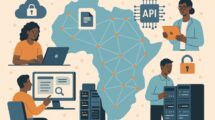Access to education is a fundamental human right at the heart of the SDGs. National Research and Education Networks (NRENs) are leaping barriers to education in the African world through e-learning. They provide higher education establishments and research centers with affordable and reliable connectivity and services. Thanks to lower connectivity prices and user-dedicated services, they help schools, vocational centers, and universities provide a better experience and foster more opportunities for their students.
When in 2020, the COVID-19 pandemic broke out, the global learning crisis deepened and inequities in education worsened. Many African countries enforced various lockdowns, and millions of students could not attend their classes in person. NRENs stepped in and proved crucial in the very survival of education institutions across the continent, supporting millions of students, researchers, and academic staff in a smooth transition to remote learning.
An example of this was the Research and Education Network of Uganda (RENU), which brought metro eduroam to over 500 hotspots countrywide, providing off-campus Wi-Fi connection to users who could not visit their university campus. Building on the success of this service, in September 2022, RENU launched eduroam on the Go, a pocket-size routing device that enables researchers and university staff to connect to eduroam fulltime and not only from a few fixed locations. Both innovations work with the same authentication infrastructure as eduroam, so the features of security and gratuity for the users remain unchanged.
Meanwhile, in Kenya, university students could access their online education resources thanks to Kenya Education Network’s (KENET) partnerships with commercial Internet Service Providers offering discounted data bundle.
However, once a student is connected, what about the services they can access? Students need to be able to follow online courses, join trainings, download study materials, and upload their assignments. With these needs in mind, NRENs like ZAMREN in Zambia, TENET in South Africa, SLREN in Sierra Leone, MARWAN in Morocco, and CCK in Tunisia offered free access to video conferencing tools like Zoom and Jitsi, and platforms for Learning Management Systems like Moodle to their member institutions to help lecturers and students sustain teaching, ensuring learning continued across the continent during the pandemic.
By giving students the same opportunities to connect and have access to material and training, NRENs are providing them with the prospect of better employment opportunities. Ranging from ICT workshops and capacity-building tutorials – like the Campus Technology Internship Program (CTIP) run by Eko-Konnect in Nigeria and the Somali Network Operators’ Group (SomNOG) by SomaliREN – to hackathons for young girls – like ICT4Girls also in Nigeria, these and other internship programmes and training courses that NRENs run contribute to the employability of the local university graduates. They also improve service delivery, aiming to bridge the gap between today’s advanced computing and networking technologies in the continent’s higher education community.
In a world where the SDGs have become parameters to measure the very purpose of existence of an organization, every day, NRENs in Africa prove inspirational to other organizations and businesses around the globe in the achievement of SDG 4 (quality education) and confirm their identity as key players in making concrete progress towards a better planet for leaners.
Visit the AfricaConnect3 SDGs Info Centre to learn more about how African research and education networks are contributing to SDGs.





